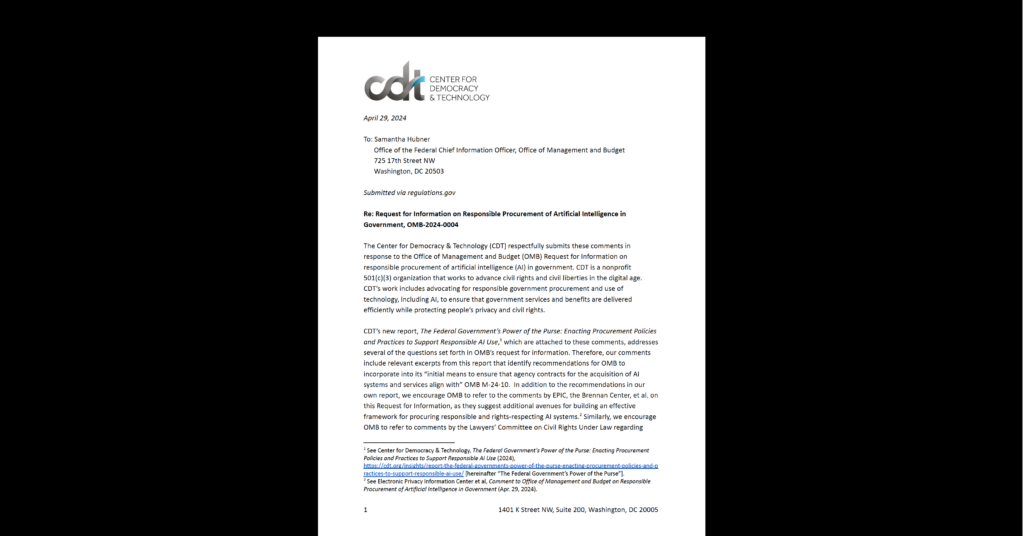Cybersecurity & Standards, Open Internet
Nuala O’Connor Opening Comments for FCC Open Internet Roundtable
CDT President & CEO Nuala O’Connor participated in the FCC’s Open Internet Roundtable on October 7, 2014. In her remarks, O’Connor stressed the need for strong Open Internet rules built on the principles of no blocking and nondiscrimination, while allowing for reasonable network management. She encouraged the FCC to consider all proposals on the table, and specifically highlighted various hybrid approaches that would utilize Title II and Section 706 options.
O’Connor’s comments are below:
Thank you, Jon, for that question. And thank you to Chairman Wheeler and the Commissioners for their courage in attempting to resolve this threshold question affecting the open nature of the Internet.
First and foremost, we at the Center for Democracy & Technology believe that all options should be on the table. We encourage the Commission to thoroughly examine the range of hybrid approaches we will discuss on this panel, along with the more familiar paths of exclusive reliance on Title II or Section 706.
We understand fully the challenges presented by the existing legal landscape. We desire a permanent playing field that not only provides certainty for companies—both existing and emerging—but even more importantly, we seek rules that preserve the nature of the Internet as a vehicle for personal engagement in a full and rich digital life, including civic participation, economic growth, and personal expression.
We are mindful that whatever approach is taken, the following principles must be articulated and enforced: the rules must provide first, for a strong principle and reality of baseline non-discrimination on the Internet. Second, the rule must contain a no-blocking provision. Third, the rules may provide for reasonable network management. Fourth, individuals need full transparency about the services and practices of the companies with which they do business or which affect their ability to access information online. These are the principles that have informed our views on the best path forward for strong open Internet rules, and the many proposals received by the FCC should be considered in this light.
As CDT noted in earlier comments [both here and here], reclassifying broadband Internet access service as a Title II telecommunications service would provide a stable base of legal authority for protecting an open Internet. We recognize also the possibility of 706 rules, but caution that the commercially reasonable standard does not adequately protect the legitimate needs and expectations of users throughout the Internet ecosystem. Certain practices may be “commercially reasonable” but inconsistent with fundamental principles of Internet openness.
And so we are intrigued by, and explore more fully in our written comments in this proceeding, the possibility of employing hybrid approaches combining some elements of Title II and Section 706 to govern the Internet ecosystem. Under the hybrid approach proposed in Mozilla’s May 5 petition and discussed in our comments, Title II would govern relationships between ISPs and edge providers while Section 706 would continue to govern relationships between ISPs and end-users.
Such a proposal is consistent with the Verizon court’s recognition that ISPs provide distinct services to subscribers and edge providers. Further, it recognizes that one of these services is a business-to-business service—the service ISPs provide to the “edge” of the network; while the other is a segregable business-to-consumer service. The Commission could classify the business-to-business relationship as a Title II service and then rely on its forbearance authority to ensure that rules are narrowly focused on prohibiting blocking and unreasonable discrimination against edge providers while permitting reasonable network management.
For the business-to-consumer relationship, Section 706 could provide a source of authority for rules that protect consumers while permitting individualized negotiation and experimentation by ISPs. As mentioned above however, the NPRM’s proposed “commercially reasonable” standard is likely insufficient to adequately protect Internet users. With a stronger standard, this hybrid approach could provide adequate end-to-end open Internet protections.
A second hybrid approach would reclassify broadband Internet access service as a Title II telecommunications service but rely on Section 706 for specific open Internet protections. Under this approach, Title II would serve only as “backstop” if rules promulgated under the Commission’s 706 authority proved insufficient. Versions of this approach appear in AOL’s initial comments in this proceeding and in a more recent letter by Congressman Waxman. As with the Mozilla petition, CDT believes this proposal is worthy of the Commission’s full consideration.
Again, we appreciate the opportunity to assist in advancing the dialogue while at all times focusing on the needs of the individual Internet user. In our view, the innovation and creativity that are the hallmarks of the Internet should be matched by a policy architecture that is innovative and that meaningfully protects core open Internet values.


